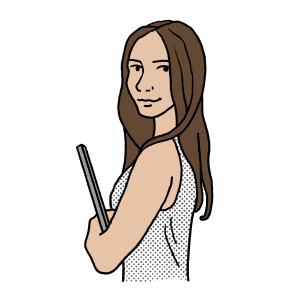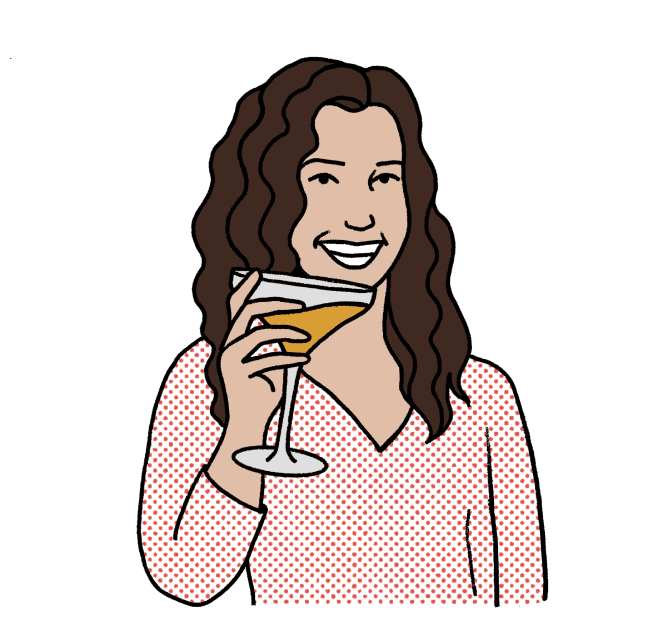How I Went From Minimum Wage to Charging More Than $100 per Hour
The case for specialization
In 2020, I was juggling three jobs—receptionist at a gym, intern at a music company, and bartender at a club. I was paid either in tips (if you count spare change as “tips”), minimum wage, or both. The assigned duties matched the pay: I’d give guests a tour of the gym, ship hundreds of CDs to radio stations, and scrub pizza grease from high tops. In other words, I was replaceable and unspecialized.
When Covid-19 slammed into New York City, my three bosses let me go from all three jobs. This swath of free time encouraged self-reflection, and after months of deliberation, I decided to pursue my dream of becoming a freelance writer.
There was just one problem: I felt comically unprepared and unqualified.
Up until that point, I’d been doing what creator Khe Hy calls “$10/hour work.” It’s the type of work you can a) train almost anyone to do and b) easily do while hungover. I didn’t have a lot of experience or initiative, since I was used to deferring to a manager.
To become a freelance creative, I had to learn a plethora of skills: copywriting, negotiation, project management, client relations, cold pitching. But most importantly, I had to develop a sense of self-confidence.
There was no one to hold my hand or babysit my every move. For the first time, I had to trust myself to figure things out, even if I didn’t have the answers or feel ready.
I spent the fall of 2020 figuring it out (while screwing up a lot along the way). In October, I hired a freelance writing coach to help accelerate the process, and she suggested I start charging $250 per article. As someone who’d been earning a few dollars for each article on Medium, this seemed bananas.
But when I told a potential client about my $250 rate, they didn’t flinch. This was a huge confidence boost, considering until that point other people—from a corporation to a heavily intoxicated customer—decided my worth.
Setting my own rates made me think, Wow, what else am I capable of? This confidence boost led to me joining online writing courses, reading books on freelancing, and watching videos on all things content marketing.
Now we’re talking, I thought. I started providing services that not everyone could do (and that you certainly couldn’t do hungover). This was the leverage I needed to continue raising my prices—today, I’m earning more than $100 an hour (my record is $300!).
So, how can you part ways with minimum wage?
Cultivate domain-specific expertise. Here’s what I mean by this:
Find a skill you naturally gravitate toward. This is important. If you select something you think you “should” be doing instead of what you want to do, you’ll never beat the competition (and you’ll likely end up resenting it). To figure this out, ask yourself what you did for fun as a child. In my case, I’ve kept diaries and written stories since I was six.
Learn so you know more about this skill than 90% of people. Immerse yourself in books, seminars, courses, communities, etc. This isn’t about you becoming a “pro,” but developing a foundation of information where right off the bat, you’re more knowledgeable on this skill than the average person.
Promote yourself ad nauseam. This information won’t set you up for success if no one else knows what you do! In my case, I set up a Twitter profile where for two years I shared my learnings, experiences, and setbacks. This helped me find clients and develop a network of other writers.
These steps all build to one goal—getting you to a place where not just anyone can sub in and do your job. It’s easy to train a person to scrub pizza grease from tables. But asking someone to write a 2,000 word SEO-optimized article on B2B SaaS with meta tags and backlinks? That’s a different story.
This isn’t rocket science—the harder you are to replace, the higher rates you’ll command. But the first step of specializing, whether your interests lie in writing, designing, massage therapy, whatever, is realizing that a) you are capable of learning new skills and b) the internet is a great place to start learning and promoting yourself.
Sure, you’ll be terrible at it at first and no, you probably won’t earn a lot of money to start. In fact, at the beginning of my writing career, I learned less than minimum wage, as I hadn’t found my writing flow.
There was one time a $250 article took me 17 hours, leading to a grand total of $14 an hour (less if you include the 25% income tax freelancers pay). Ugh.
However, this learning curve will quickly even itself out and pay off. The coolest part about reaching $100 per hour isn’t even the money. It’s stepping into the driver’s seat of your life and showing everyone what you’re capable of. But to get to your destination, don’t wait for anyone to give you a green light.
How I Went From Minimum Wage to Charging More Than $100 per Hour
The case for specialization
In 2020, I was juggling three jobs—receptionist at a gym, intern at a music company, and bartender at a club. I was paid either in tips (if you count spare change as “tips”), minimum wage, or both. The assigned duties matched the pay: I’d give guests a tour of the gym, ship hundreds of CDs to radio stations, and scrub pizza grease from high tops. In other words, I was replaceable and unspecialized.
When Covid-19 slammed into New York City, my three bosses let me go from all three jobs. This swath of free time encouraged self-reflection, and after months of deliberation, I decided to pursue my dream of becoming a freelance writer.
There was just one problem: I felt comically unprepared and unqualified.
Up until that point, I’d been doing what creator Khe Hy calls “$10/hour work.” It’s the type of work you can a) train almost anyone to do and b) easily do while hungover. I didn’t have a lot of experience or initiative, since I was used to deferring to a manager.
To become a freelance creative, I had to learn a plethora of skills: copywriting, negotiation, project management, client relations, cold pitching. But most importantly, I had to develop a sense of self-confidence.
There was no one to hold my hand or babysit my every move. For the first time, I had to trust myself to figure things out, even if I didn’t have the answers or feel ready.
I spent the fall of 2020 figuring it out (while screwing up a lot along the way). In October, I hired a freelance writing coach to help accelerate the process, and she suggested I start charging $250 per article. As someone who’d been earning a few dollars for each article on Medium, this seemed bananas.
But when I told a potential client about my $250 rate, they didn’t flinch. This was a huge confidence boost, considering until that point other people—from a corporation to a heavily intoxicated customer—decided my worth.
Setting my own rates made me think, Wow, what else am I capable of? This confidence boost led to me joining online writing courses, reading books on freelancing, and watching videos on all things content marketing.
Now we’re talking, I thought. I started providing services that not everyone could do (and that you certainly couldn’t do hungover). This was the leverage I needed to continue raising my prices—today, I’m earning more than $100 an hour (my record is $300!).
So, how can you part ways with minimum wage?
Cultivate domain-specific expertise. Here’s what I mean by this:
Find a skill you naturally gravitate toward. This is important. If you select something you think you “should” be doing instead of what you want to do, you’ll never beat the competition (and you’ll likely end up resenting it). To figure this out, ask yourself what you did for fun as a child. In my case, I’ve kept diaries and written stories since I was six.
Learn so you know more about this skill than 90% of people. Immerse yourself in books, seminars, courses, communities, etc. This isn’t about you becoming a “pro,” but developing a foundation of information where right off the bat, you’re more knowledgeable on this skill than the average person.
Promote yourself ad nauseam. This information won’t set you up for success if no one else knows what you do! In my case, I set up a Twitter profile where for two years I shared my learnings, experiences, and setbacks. This helped me find clients and develop a network of other writers.
These steps all build to one goal—getting you to a place where not just anyone can sub in and do your job. It’s easy to train a person to scrub pizza grease from tables. But asking someone to write a 2,000 word SEO-optimized article on B2B SaaS with meta tags and backlinks? That’s a different story.
This isn’t rocket science—the harder you are to replace, the higher rates you’ll command. But the first step of specializing, whether your interests lie in writing, designing, massage therapy, whatever, is realizing that a) you are capable of learning new skills and b) the internet is a great place to start learning and promoting yourself.
Sure, you’ll be terrible at it at first and no, you probably won’t earn a lot of money to start. In fact, at the beginning of my writing career, I learned less than minimum wage, as I hadn’t found my writing flow.
There was one time a $250 article took me 17 hours, leading to a grand total of $14 an hour (less if you include the 25% income tax freelancers pay). Ugh.
However, this learning curve will quickly even itself out and pay off. The coolest part about reaching $100 per hour isn’t even the money. It’s stepping into the driver’s seat of your life and showing everyone what you’re capable of. But to get to your destination, don’t wait for anyone to give you a green light.
How I Went From Minimum Wage to Charging More Than $100 per Hour
The case for specialization
In 2020, I was juggling three jobs—receptionist at a gym, intern at a music company, and bartender at a club. I was paid either in tips (if you count spare change as “tips”), minimum wage, or both. The assigned duties matched the pay: I’d give guests a tour of the gym, ship hundreds of CDs to radio stations, and scrub pizza grease from high tops. In other words, I was replaceable and unspecialized.
When Covid-19 slammed into New York City, my three bosses let me go from all three jobs. This swath of free time encouraged self-reflection, and after months of deliberation, I decided to pursue my dream of becoming a freelance writer.
There was just one problem: I felt comically unprepared and unqualified.
Up until that point, I’d been doing what creator Khe Hy calls “$10/hour work.” It’s the type of work you can a) train almost anyone to do and b) easily do while hungover. I didn’t have a lot of experience or initiative, since I was used to deferring to a manager.
To become a freelance creative, I had to learn a plethora of skills: copywriting, negotiation, project management, client relations, cold pitching. But most importantly, I had to develop a sense of self-confidence.
There was no one to hold my hand or babysit my every move. For the first time, I had to trust myself to figure things out, even if I didn’t have the answers or feel ready.
I spent the fall of 2020 figuring it out (while screwing up a lot along the way). In October, I hired a freelance writing coach to help accelerate the process, and she suggested I start charging $250 per article. As someone who’d been earning a few dollars for each article on Medium, this seemed bananas.
But when I told a potential client about my $250 rate, they didn’t flinch. This was a huge confidence boost, considering until that point other people—from a corporation to a heavily intoxicated customer—decided my worth.
Setting my own rates made me think, Wow, what else am I capable of? This confidence boost led to me joining online writing courses, reading books on freelancing, and watching videos on all things content marketing.
Now we’re talking, I thought. I started providing services that not everyone could do (and that you certainly couldn’t do hungover). This was the leverage I needed to continue raising my prices—today, I’m earning more than $100 an hour (my record is $300!).
So, how can you part ways with minimum wage?
Cultivate domain-specific expertise. Here’s what I mean by this:
Find a skill you naturally gravitate toward. This is important. If you select something you think you “should” be doing instead of what you want to do, you’ll never beat the competition (and you’ll likely end up resenting it). To figure this out, ask yourself what you did for fun as a child. In my case, I’ve kept diaries and written stories since I was six.
Learn so you know more about this skill than 90% of people. Immerse yourself in books, seminars, courses, communities, etc. This isn’t about you becoming a “pro,” but developing a foundation of information where right off the bat, you’re more knowledgeable on this skill than the average person.
Promote yourself ad nauseam. This information won’t set you up for success if no one else knows what you do! In my case, I set up a Twitter profile where for two years I shared my learnings, experiences, and setbacks. This helped me find clients and develop a network of other writers.
These steps all build to one goal—getting you to a place where not just anyone can sub in and do your job. It’s easy to train a person to scrub pizza grease from tables. But asking someone to write a 2,000 word SEO-optimized article on B2B SaaS with meta tags and backlinks? That’s a different story.
This isn’t rocket science—the harder you are to replace, the higher rates you’ll command. But the first step of specializing, whether your interests lie in writing, designing, massage therapy, whatever, is realizing that a) you are capable of learning new skills and b) the internet is a great place to start learning and promoting yourself.
Sure, you’ll be terrible at it at first and no, you probably won’t earn a lot of money to start. In fact, at the beginning of my writing career, I learned less than minimum wage, as I hadn’t found my writing flow.
There was one time a $250 article took me 17 hours, leading to a grand total of $14 an hour (less if you include the 25% income tax freelancers pay). Ugh.
However, this learning curve will quickly even itself out and pay off. The coolest part about reaching $100 per hour isn’t even the money. It’s stepping into the driver’s seat of your life and showing everyone what you’re capable of. But to get to your destination, don’t wait for anyone to give you a green light.
Lens in your inbox
Lens features creator stories that inspire, inform, and entertain.
Subscribe to our weekly newsletter so you never miss a story.
Lens in your inbox
Lens features creator stories that inspire, inform, and entertain.
Subscribe to our weekly newsletter so you never miss a story.
Lens in your inbox
Lens features creator stories that inspire, inform, and entertain.
Subscribe to our weekly newsletter so you never miss a story.




